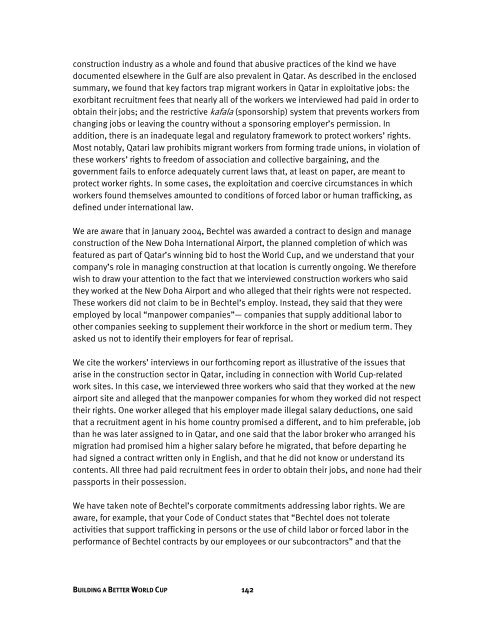Download the full report - Human Rights Watch
Download the full report - Human Rights Watch
Download the full report - Human Rights Watch
Create successful ePaper yourself
Turn your PDF publications into a flip-book with our unique Google optimized e-Paper software.
construction industry as a whole and found that abusive practices of <strong>the</strong> kind we have<br />
documented elsewhere in <strong>the</strong> Gulf are also prevalent in Qatar. As described in <strong>the</strong> enclosed<br />
summary, we found that key factors trap migrant workers in Qatar in exploitative jobs: <strong>the</strong><br />
exorbitant recruitment fees that nearly all of <strong>the</strong> workers we interviewed had paid in order to<br />
obtain <strong>the</strong>ir jobs; and <strong>the</strong> restrictive kafala (sponsorship) system that prevents workers from<br />
changing jobs or leaving <strong>the</strong> country without a sponsoring employer’s permission. In<br />
addition, <strong>the</strong>re is an inadequate legal and regulatory framework to protect workers’ rights.<br />
Most notably, Qatari law prohibits migrant workers from forming trade unions, in violation of<br />
<strong>the</strong>se workers’ rights to freedom of association and collective bargaining, and <strong>the</strong><br />
government fails to enforce adequately current laws that, at least on paper, are meant to<br />
protect worker rights. In some cases, <strong>the</strong> exploitation and coercive circumstances in which<br />
workers found <strong>the</strong>mselves amounted to conditions of forced labor or human trafficking, as<br />
defined under international law.<br />
We are aware that in January 2004, Bechtel was awarded a contract to design and manage<br />
construction of <strong>the</strong> New Doha International Airport, <strong>the</strong> planned completion of which was<br />
featured as part of Qatar’s winning bid to host <strong>the</strong> World Cup, and we understand that your<br />
company’s role in managing construction at that location is currently ongoing. We <strong>the</strong>refore<br />
wish to draw your attention to <strong>the</strong> fact that we interviewed construction workers who said<br />
<strong>the</strong>y worked at <strong>the</strong> New Doha Airport and who alleged that <strong>the</strong>ir rights were not respected.<br />
These workers did not claim to be in Bechtel’s employ. Instead, <strong>the</strong>y said that <strong>the</strong>y were<br />
employed by local “manpower companies”— companies that supply additional labor to<br />
o<strong>the</strong>r companies seeking to supplement <strong>the</strong>ir workforce in <strong>the</strong> short or medium term. They<br />
asked us not to identify <strong>the</strong>ir employers for fear of reprisal.<br />
We cite <strong>the</strong> workers’ interviews in our forthcoming <strong>report</strong> as illustrative of <strong>the</strong> issues that<br />
arise in <strong>the</strong> construction sector in Qatar, including in connection with World Cup-related<br />
work sites. In this case, we interviewed three workers who said that <strong>the</strong>y worked at <strong>the</strong> new<br />
airport site and alleged that <strong>the</strong> manpower companies for whom <strong>the</strong>y worked did not respect<br />
<strong>the</strong>ir rights. One worker alleged that his employer made illegal salary deductions, one said<br />
that a recruitment agent in his home country promised a different, and to him preferable, job<br />
than he was later assigned to in Qatar, and one said that <strong>the</strong> labor broker who arranged his<br />
migration had promised him a higher salary before he migrated, that before departing he<br />
had signed a contract written only in English, and that he did not know or understand its<br />
contents. All three had paid recruitment fees in order to obtain <strong>the</strong>ir jobs, and none had <strong>the</strong>ir<br />
passports in <strong>the</strong>ir possession.<br />
We have taken note of Bechtel’s corporate commitments addressing labor rights. We are<br />
aware, for example, that your Code of Conduct states that “Bechtel does not tolerate<br />
activities that support trafficking in persons or <strong>the</strong> use of child labor or forced labor in <strong>the</strong><br />
performance of Bechtel contracts by our employees or our subcontractors” and that <strong>the</strong><br />
BUILDING A BETTER WORLD CUP 142

















